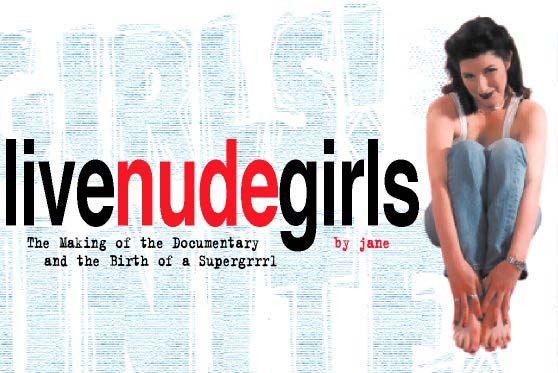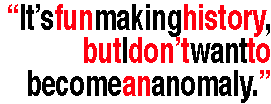
|
Live! Nude! Girls! Unite! is a riveting documentary about the first union movement by strippers across the U.S. In a nutshell, it is about dancers employed by the Lusty Lady in San Francisco, who, after complaining to management for eight years about conditions they deemed unfair and illegal, took matters into their own hands. The film is brilliant and timely in its portrayal of strippers as workers, fighting for their basic rights, while simultaneously depicting a hypocritical society which isn't quite sure if strippers are workers at all or deserve workers' rights. Indeed, the question is raised whether America thinks naked girls and sex workers deserve even basic human rights like respect and fair treatment. While the union drive by the girls struggles and overcomes various impasses, filmmaker Julia Query follows an intimate subplot as she examines her personal struggle with her feminist doctor mother, who works to get prostitutes off the streets and has no idea that her precious, brilliant daughter is also a sex worker. This often troublesome and unwieldy dichotomy of the personal and the political lies at the heart of all "sex wars" and feminist discourse, and Query's examination of it elevates her film from mere documentary to a very dynamic meditation on the turbulent nature of feminism in the nineties, in which generational, sexual, and gender politics figure into an explosive mix. Query is well-prepared to juggle these various issues, having almost two years in a PhD program in Sociology that focused on sexuality, postmodern theo |
ry, and queer theory before jumping ship to take up the bump'n'grind in San Fran. The decision to leave academia was easy for Query, who had at least six very expensive years to go. When she weighed the debt, the limited job openings and the meager starting salary of $30,000 a year, she says, "stripping won, hands down." "When people talk to me about stripping being damaging, actually, the academic grind was far more damaging than stripping," Query says, adding that she was already a stand-up comedian, a writer, and an artist, and those things were more satisfying than academia. So she took a "break," intending to strip for a few months that turned into four years. During this time she made history. And a film. Though Live! Nude! Girls! Unite! deals at length with Query's personal situation and its far-reaching political issues, it never loses sight of its primary message that strippers are WORKERS and as such deserve the same rights accorded to all American workers. Rights such as minimum wage, health insurance, and means to legal recourse should problems arise. As obvious as this argument may sound, it took an all-out war to achieve. But, as Query likes to point out, it took the miners 100 years to win their union fight, so in unionizing in less than a year, the Lusty Lady strippers made incredible time. The movie illustrates just how |
much blood, sweat, and tears were required from the dancers as they fought the big dogs in management and the notorious union busting law firm, Witler Mendelssohn, they hired. In the beginning of the film, very powerful people like TV newscasters, lawyers, and management say absolutely idiotic things in an attempt to belittle, ridicule, and harass the strippers into compliance. "Bad idea," Query says. "Strippers aren't easily intimidated by men in suits." The girls hold their ground, in spite of loss of income, tons of stress, and many tears. For much of the film, they seem to be the only people with their heads on straight at all. Which is exactly why Query made her film: to take back power from the media by allowing the girls to have their own voice and to record their side of the story as it was happening. The whole union fight started over one grating irritation that, after eight years of worker complaints, the Lusty Lady management failed to do anything about. The strippers kept insisting that the three one-way
|
